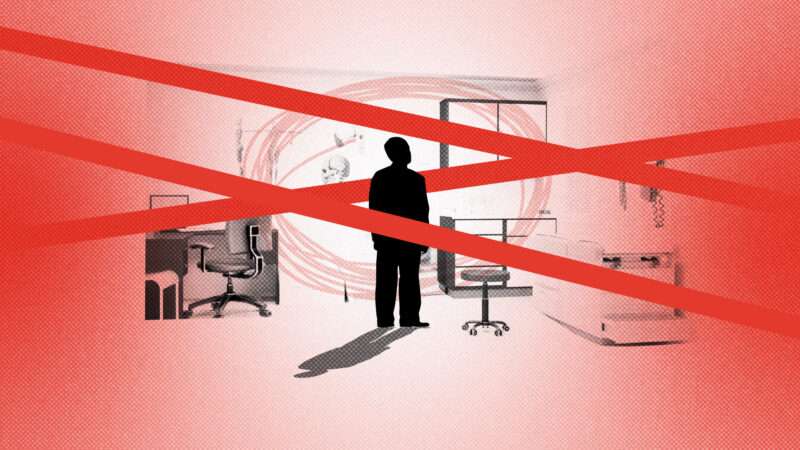使用Player FM应用程序离线!
Why We Can't Have Nice Things: Permission Slips for Innovation
Manage episode 440714876 series 3498470

Dr. Jay Singleton remembers the moment when he realized that Certificate of Need laws were serious business.
"He stood up and stared at me and hit his hands on the table," Singleton recalls. "And he said, 'well, we're going to fight you on this.'"
As we explained in last week's episode of Why We Can't Have Nice Things, Singleton has been trying to open a new cataract surgical center in New Bern, North Carolina. He'd met with the CEO of the local hospital as a friendly gesture. What he got was the promise of a protracted legal fight.
Earlier this year, Singleton's case made it to the North Carolina Supreme Court—though he is still likely a long way away from having a final resolution. Meanwhile, his patients continue to face higher costs: Singleton says that a surgery that would cost $1,800 at his clinic instead costs about $6,000 at the hospital up the road.
Joshua Windham, the Institute for Justice attorney who is litigating Singleton's case, says the problem lies with North Carolina's Certificate of Need (CON) law, which gives government regulators—rather than patients or consumers—the power to decide what services are needed.
"They're really permission slip requirements for innovators," says Windham. "The government can't possibly know these things in advance, in part because people's perceptions of their own needs will change, but also because the facts of reality will change."
In some places, those roadblocks to innovation in health care are starting to fall. Also on this week's episode, we'll follow up on Katie Chubb's efforts to open a new birth center in Georgia—something she'll now be able to do after the state legislature passed and Gov. Brian Kemp signed a major CON reform earlier this year.
"It's definitely propelled me forward and made me realize that even the smallest person in somewhere remote as Augusta can start some changes," says Chubb.
Further reading for this week's episode:
"New Georgia Law Allows Birthing Centers To Open Without Needing Permission From Nearby Hospitals," by Eric Boehm, Reason
"North Carolinians Are Being Conned by Certificate of Need Laws," by Christina Smith, Citizens Against Government Waste
"The Powerful Council Overseeing North Carolina's Health Care," by Jeanette Doran, Carolina Journal
"Kemp Signs Major Reforms to CON Law," by Dave Williams, Capital Beat News Service
"The Con of Certificate of Need Laws," by Veronique de Rugy, Mercatus Center
Written by Eric Boehm; produced and edited by Hunt Beaty; fact-checking by Anthony Wallace.
- Producer: Hunt Beaty
The post Why We Can't Have Nice Things: Permission Slips for Innovation appeared first on Reason.com.
14集单集
Manage episode 440714876 series 3498470

Dr. Jay Singleton remembers the moment when he realized that Certificate of Need laws were serious business.
"He stood up and stared at me and hit his hands on the table," Singleton recalls. "And he said, 'well, we're going to fight you on this.'"
As we explained in last week's episode of Why We Can't Have Nice Things, Singleton has been trying to open a new cataract surgical center in New Bern, North Carolina. He'd met with the CEO of the local hospital as a friendly gesture. What he got was the promise of a protracted legal fight.
Earlier this year, Singleton's case made it to the North Carolina Supreme Court—though he is still likely a long way away from having a final resolution. Meanwhile, his patients continue to face higher costs: Singleton says that a surgery that would cost $1,800 at his clinic instead costs about $6,000 at the hospital up the road.
Joshua Windham, the Institute for Justice attorney who is litigating Singleton's case, says the problem lies with North Carolina's Certificate of Need (CON) law, which gives government regulators—rather than patients or consumers—the power to decide what services are needed.
"They're really permission slip requirements for innovators," says Windham. "The government can't possibly know these things in advance, in part because people's perceptions of their own needs will change, but also because the facts of reality will change."
In some places, those roadblocks to innovation in health care are starting to fall. Also on this week's episode, we'll follow up on Katie Chubb's efforts to open a new birth center in Georgia—something she'll now be able to do after the state legislature passed and Gov. Brian Kemp signed a major CON reform earlier this year.
"It's definitely propelled me forward and made me realize that even the smallest person in somewhere remote as Augusta can start some changes," says Chubb.
Further reading for this week's episode:
"New Georgia Law Allows Birthing Centers To Open Without Needing Permission From Nearby Hospitals," by Eric Boehm, Reason
"North Carolinians Are Being Conned by Certificate of Need Laws," by Christina Smith, Citizens Against Government Waste
"The Powerful Council Overseeing North Carolina's Health Care," by Jeanette Doran, Carolina Journal
"Kemp Signs Major Reforms to CON Law," by Dave Williams, Capital Beat News Service
"The Con of Certificate of Need Laws," by Veronique de Rugy, Mercatus Center
Written by Eric Boehm; produced and edited by Hunt Beaty; fact-checking by Anthony Wallace.
- Producer: Hunt Beaty
The post Why We Can't Have Nice Things: Permission Slips for Innovation appeared first on Reason.com.
14集单集
所有剧集
×欢迎使用Player FM
Player FM正在网上搜索高质量的播客,以便您现在享受。它是最好的播客应用程序,适用于安卓、iPhone和网络。注册以跨设备同步订阅。




